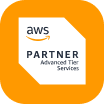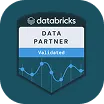Top 10 SEO Ranking APIs That Provide the Best Data
Search rankings change faster than ever. Learn why static rank checks are outdated and how SEO Ranking APIs give teams real-time visibility, competitive insights, and control across every market and device.

%20(1).webp)
Search visibility is never static. Rankings shift daily as promotions roll out, competitors adjust their strategies, and algorithms change. Teams that depend on static rank checks or monthly exports lose clarity about their true market position, which leads to misaligned SEO and SEM investments.
SEO Ranking APIs address this problem by providing structured, current ranking data at scale. They automate collection, mirror real user contexts across locations and devices, and deliver analysis-ready outputs directly to warehouses and dashboards. With 61% of marketers identifying improving SEO and growing organic presence as their top inbound priority, ranking APIs are becoming critical to business success.
That’s why savvy enterprises are adopting these APIs as a standard part of their data pipelines. They provide reliable visibility across markets and devices, and allow teams to respond quickly when search conditions change. Let’s explore how SEO ranking APIs work, what to look for when choosing one, and the best options for building an accurate, analysis-ready SEO ranking data pipeline.
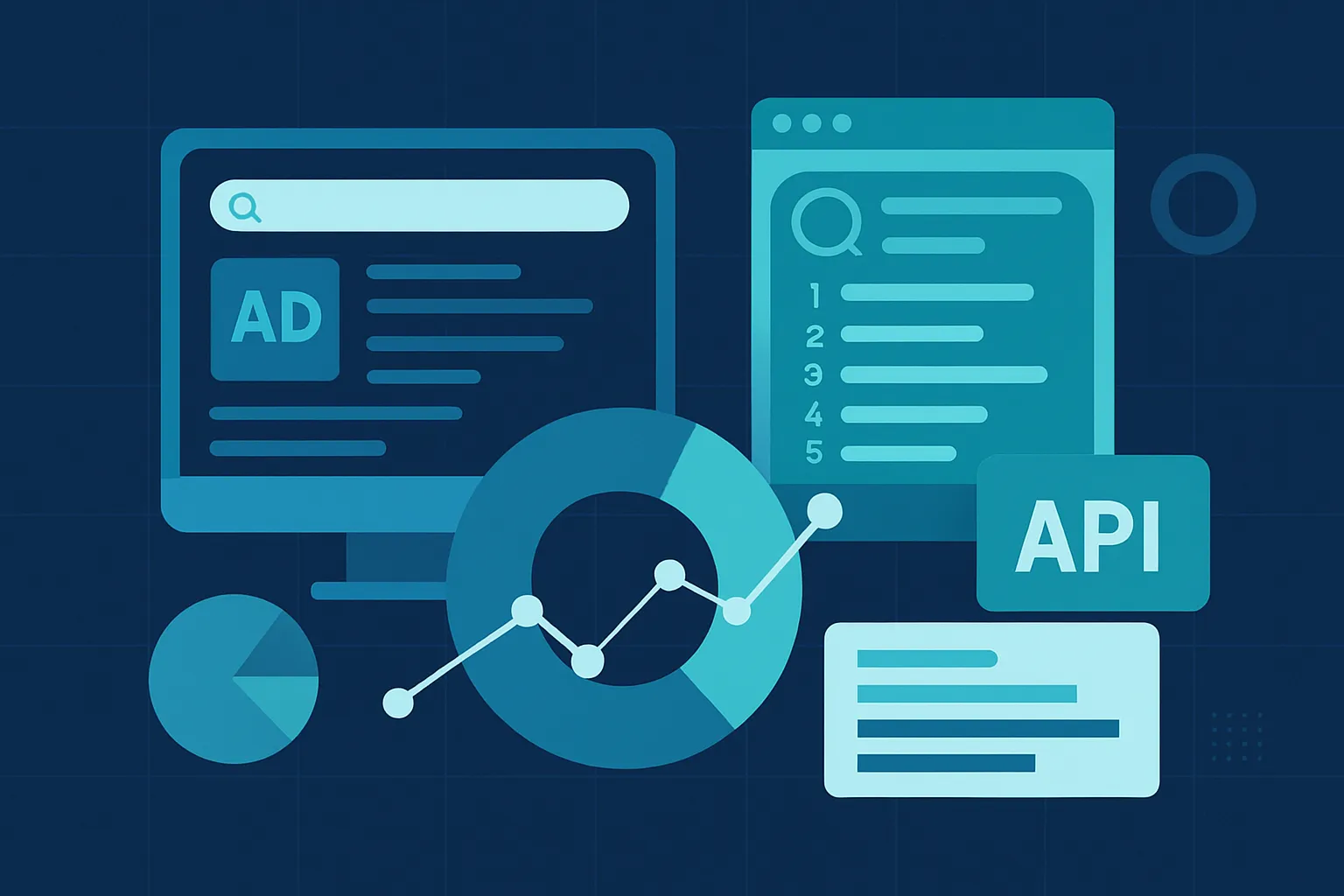
What are SEO Ranking APIs?
SEO ranking APIs are services that deliver current keyword search engine visibility at scale. They are packaged in structured, analysis-ready formats that can be piped directly into analytics models and dashboards.
Teams use these APIs to:
- Track thousands of queries with automated refreshes.
- Measure real visibility when ads and rich results push organic listings further down the page.
- Feed BI/AI workflows with normalized data.
- Benchmark competitors reliably across markets and devices.
In 2025, static rank checks and monthly exports cannot keep pace with the fragmentation of devices, locations, and evolving search features. SEO Ranking APIs keep ranking intelligence reproducible and dependable by automating external data collection at scale and delivering outputs ready for enterprise pipelines.
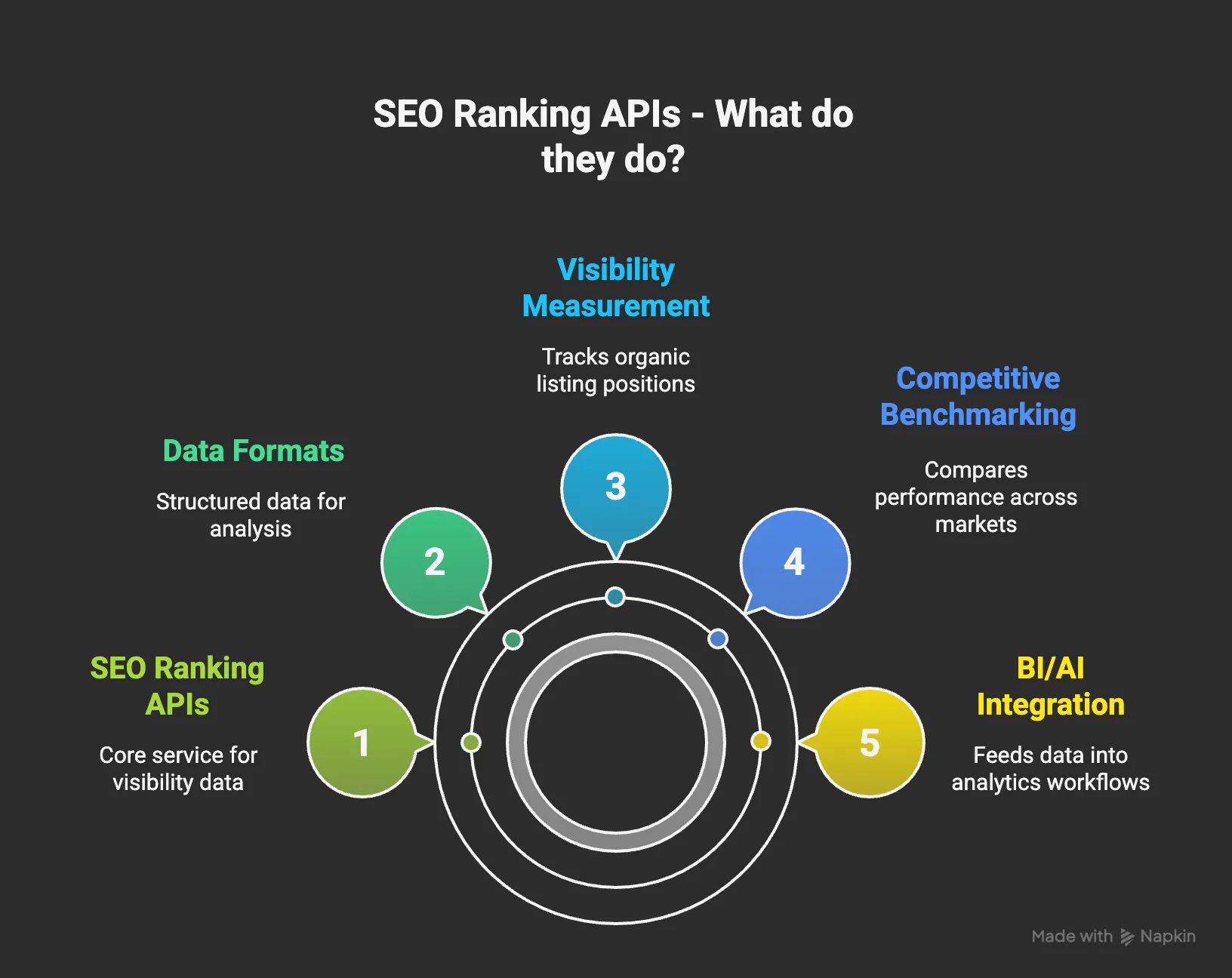
Data and SEO engineers rely on these powerful tools to maintain fresh, accurate flows of ranking data, while data and business leaders use the outputs to generate insights that guide marketing investment, lead gen campaign planning, and market positioning.
Types of SEO Ranking APIs
It’s challenging to draw strict boundaries between SEO ranking APIs because most solutions overlap in features and capabilities. A more practical approach is to look at them by application or by examining how the API is typically used.
Rank-tracking/Keyword-position APIs
Purpose-built for automated, high-volume monitoring, rank-tracking APIs return keyword positions by engine, location, and device on a preset schedule. They make it easy to store position changes over time and prioritize throughput and historical continuity. The tradeoff is limited visibility, since they provide position data without the full SERP context.
Full SERP APIs
Full SERP APIs return the entire results page in structured form, including organic listings, ads, shopping blocks, knowledge panels, and AI-generated results. Capturing the full payload allows teams to compute metrics such as share-of-SERP, pixel depth, and above-the-fold presence, while also enabling competitive comparisons and training datasets that extend beyond rank numbers alone.
All-in-one Platform APIs
The most comprehensive SEO APIs are platforms that expose rankings alongside adjacent SEO datasets, such as backlinks, traffic estimates, audits, and other various keyword metrics, through unified endpoints. This type has the upside of fewer integrations and easier cross-dataset joins, coupled with centralized governance and service billing.
Benefits of SEO Ranking APIs
SEO ranking APIs offer many benefits, including:
- Accuracy and currency: Programmatic queries reflect what users currently see in target markets and devices. Only a few providers support true real-time collection, which is critical for minimizing noise from manual checks or stale exports.
- Comprehensive and scalable tracking: Batch jobs and queues can handle tens of thousands of queries across locations and devices without teams having to maintain proxy fleets or brittle scrapers.
- Direct integration into workflows: Normalized fields and consistent schemas fit directly into data warehouses, dashboards, and ML/AI pipelines with no ad-hoc parsing or one-off transforms.
- Competitive benchmarking: Consistent data across markets and devices enables reliable comparisons and share-of-SERP monitoring against both familiar and emerging competitors.
- Efficiency and resource savings: SEO API vendors absorb the overhead of browser execution, anti-bot handling, parsing, and API testing. They free engineers and analysts to focus on modeling, experimentation, optimization, and business decisions.
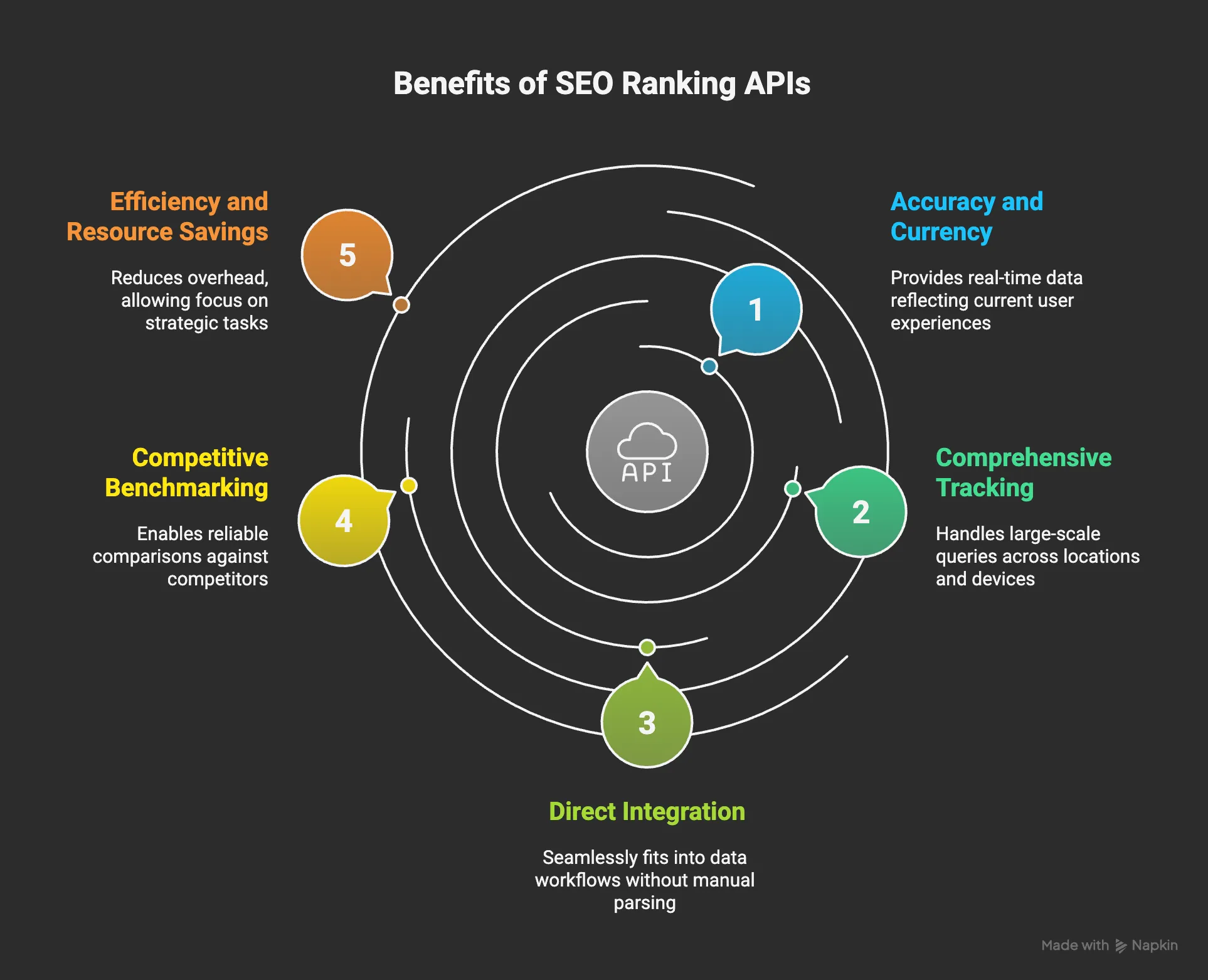
Key Features to Look for in SEO Ranking APIs
Use this checklist to evaluate providers through an enterprise lens in terms of pipeline fit, governance, and scale.
Accuracy and Real-time Data
Look for results that mirror real user contexts (clean and de-personalized queries) with on-demand or streaming collection for time-sensitive use cases. As AI surfaces reshape SERPs, confirm support for capturing new result types, such as Google’s AI Mode, so visibility isn’t undercounted.
Data Freshness and Frequency
Make sure you have complete control of cadence, whether hourly, daily, or event-driven, so recency matches decision windows for promotions or inventory changes. Seek out providers that let you choose between synchronous (“live”) and job/queue models for cost/performance tradeoffs.
Scalability and Throughput
Proxy orchestration, concurrency, and error-handling determine cost and success rates, especially at scale. Verify queue depth, features like automatic bot-handling, as well as sustained QPA (and not just “burst” claims).
Location and Device Targeting
Granular geo and device controls are vital for consistent local fidelity across markets and when targeting local searches or user groups.
Keyword and Competitor Tracking
Well-designed APIs support normalized formats such as CSV, JSON, and Parquet, with analysis-ready fields including timestamps, locale/device, and result types. Full-SERP payloads should preserve element-level structure to compute share-of-SERP, pixel depth, and AI-surface presence.
Structured Outputs
Well-designed APIs support normalized formats such as CSV, JSON, and Parquet, with analysis-ready fields including timestamps, locale/device, and result types. Full-SERP payloads should preserve element-level structure to compute share-of-SERP, pixel depth, and AI-surface presence.
Reliability and Uptime
As with any service, reliability and availability are among the most critical evaluation criteria. When choosing an SEO APIs provider, ask for proof of API security, along with published SLOs/SLAs, job logs, retry semantics, and deterministic pagination. You want a reproducible collection for audits and model training, not one-off snapshots.
Usability and Integration
Your SEO API must work smoothly with your tech stack and the teams who maintain it. Look for strong documentation and SDKs, consistent authentication/pagination across endpoints, and webhooks for job status to reduce engineering overhead and time-to-value.
Trust and Compliance
Trusted vendors only collect publicly available data, comply with privacy frameworks, and maintain clear proxy policies.
Top 10 SEO Ranking APIs for Accurate, Current Data
1. Nimble – Best for BI/ML Pipelines
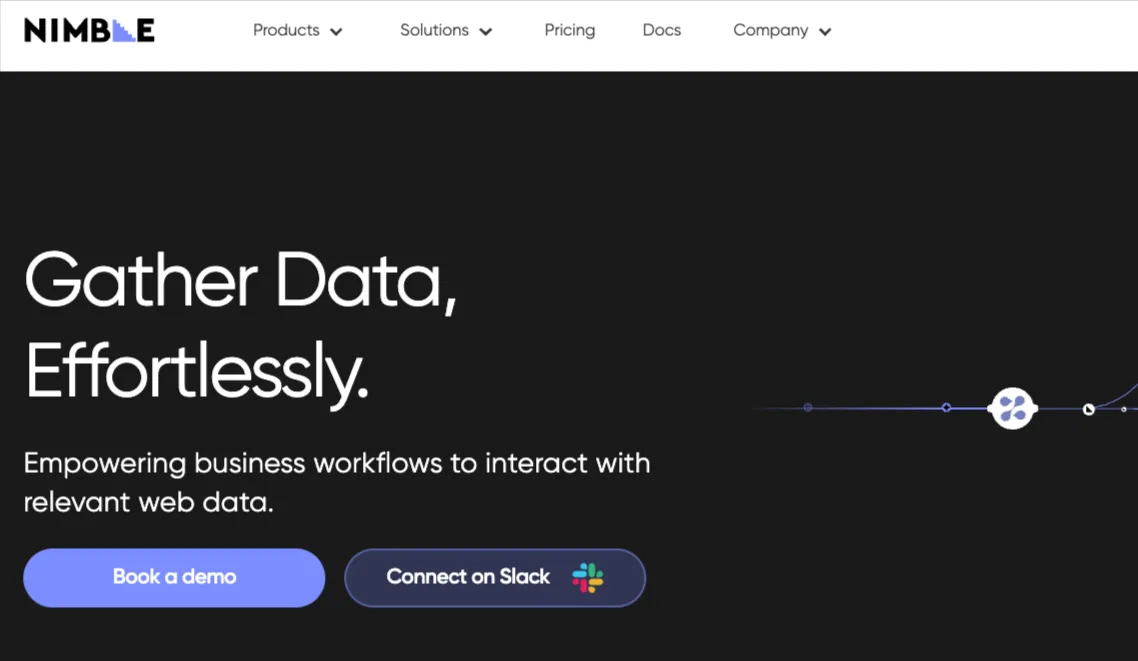
Key Features:
- Full SERP capture as structured outputs, including organic results, ads, related searches, and pagination. Outputs are ready for warehouses and dashboards with no custom parsing needed.
- Real-time data collection with job queues and pagination, plus direct delivery to cloud storage for easy ingestion.
- High success rates at scale through managed rendering, built-in proxies, and automated anti-bot handling provided by Nimble Browser and Nimble IP.
- Granular geo and device targeting to mirror genuine user contexts.
- Ideal for developers and engineers who need reliable outputs without managing infrastructure.
Pricing: Starting at $3/CPM with discounts on prepaid subscription and annual plans.
Review: “Using Nimble supercharged our data gathering capabilities, delivering clean, real-time web data we could immediately put to work.”
2. DataForSEO – Best for Granular Cost Control
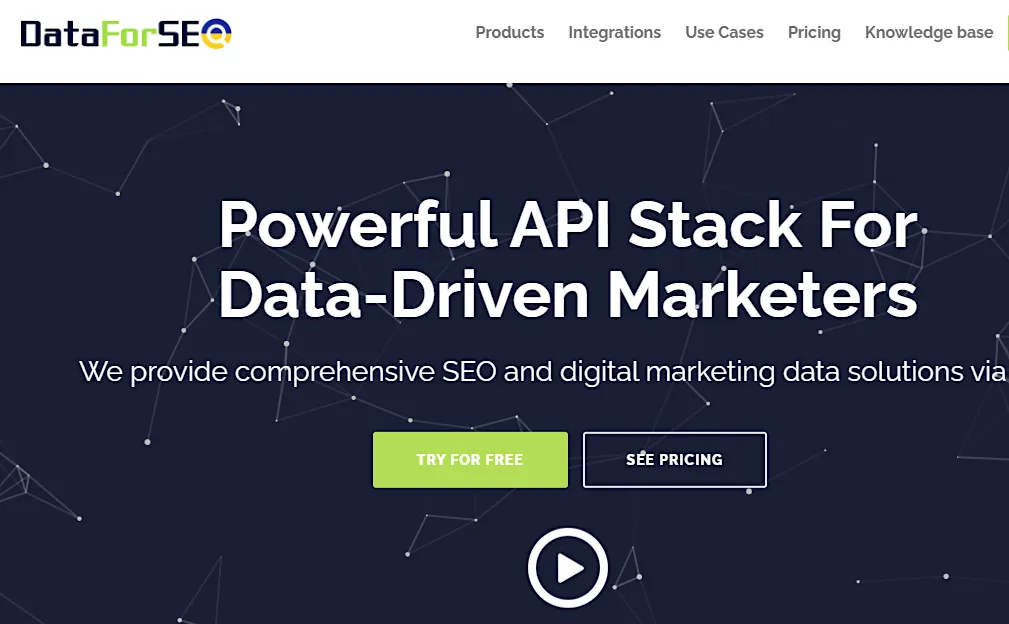
Key Features:
- Three collection modes for cost/speed control: Standard, Priority, and Live with structured SERP payloads.
- Broad engine and surface support, including Google, Bing, Yahoo, YouTube, etc., as well as Google AI Mode coverage.
- Strong geo/device fidelity with endpoints that preserve full-page context for share-of-SERP and custom metrics.
Pricing: Priority-based SERP API pricing in three tiers per 10 results: Standard at $0.0006, Priority at $0.0012, and Live at $0.002.
Review: “We were impressed by how responsive the team at DataForSEO was and by the comprehensive nature of the APIs available.”
3. Keyword.com API – Best for Position Tracking
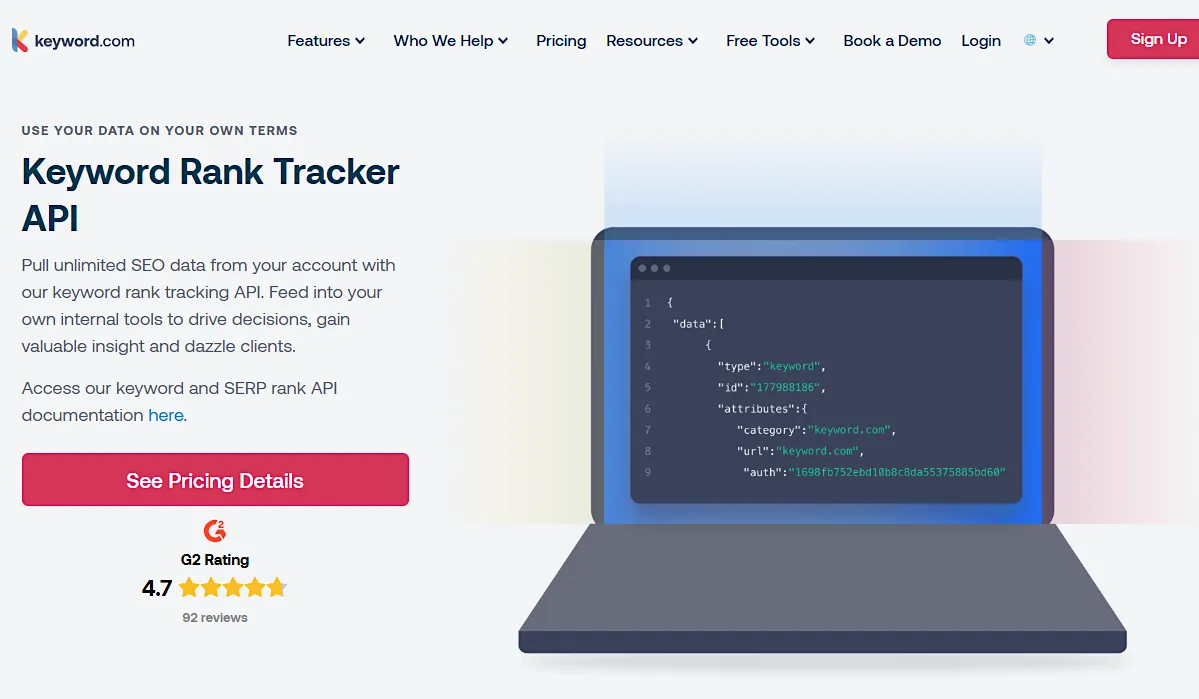
Key Features:
- Pulls stored positions and history from Keyword.com projects via a REST API.
- Built-in multi-location and device tracking.
- Agency-friendly features like white-label/embedded tables and customized exports to CSV/PDF.
- Practical for dashboards and BI by syncing rankings to internal tools without a dedicated scraper field.
Pricing: API-only plans start at $46/month for 5,000 keywords for weekly updates. Daily and bi-hourly update tiers are also available.
Review: “The tool’s ability to provide insights into AI visibility on platforms like ChatGPT is a unique advantage for staying ahead in modern SEO.”
4. SEMrush API – Best for Existing SEMrush Users
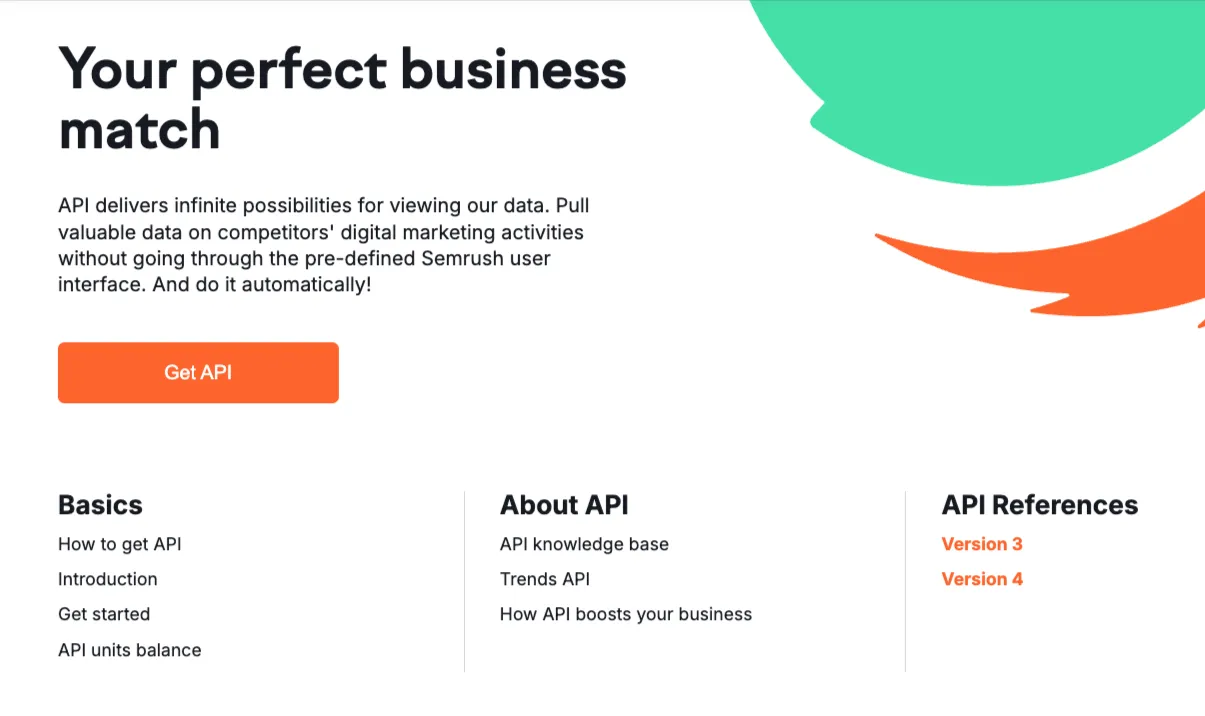
Key Features:
- Unified supplier of multiple SEO datasets.
- Analytics API for domain/keyword/backlink data.
- Projects/Position Tracking API for campaign-level ranks.
- Suited to cross-dataset analysis where ranks are joined with keyword metrics, competitive domains, and backlinks.
Pricing: Requires a SEMrush Business plan with API units purchased separately.
Review: “The amount of accurate data it gives makes our keyword research, backlinks, (and) topic researching…super smooth and clear.”
5. SerpAPI – Best for Multi-Engine Coverage
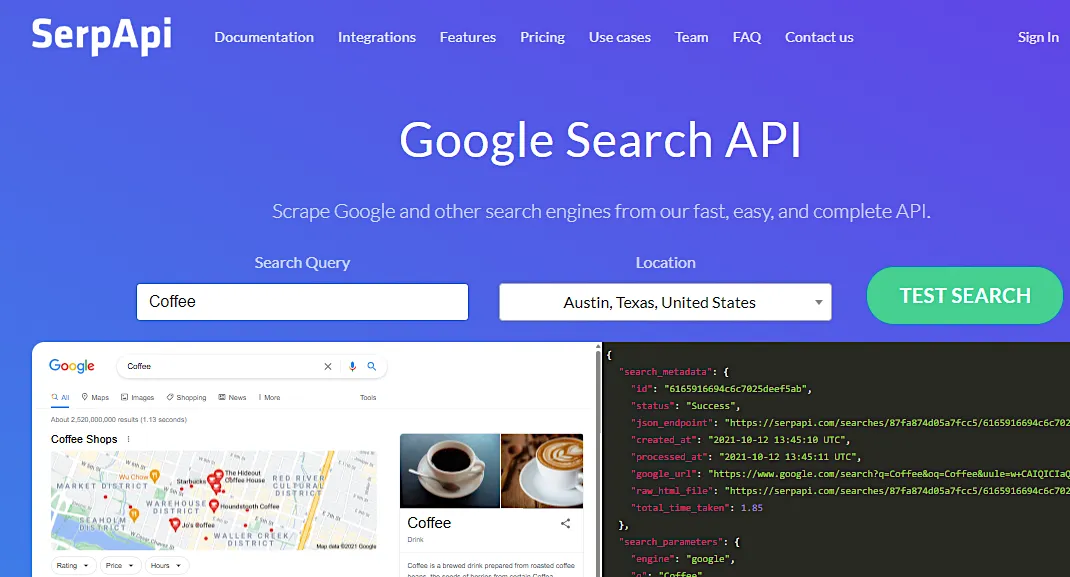
Key Features:
- Real-time, per-request execution with built-in proxies/CAPTCHA solving.
- Structured JSON covering organic plus rich elements.
- Broad engine/surface support across Google, Bing, Yahoo, Yandex, YouTube, Amazon, app stores, and more.
- AI surfaces are covered via dedicated engines and inline extraction.
- Granular geo/device targeting with a Locations API and UULE handling for fidelity.
Pricing: Free for 250 searches/month, with Standard, High Volume, and Enterprise tiers available starting at $75/month for 5000 searches.
Review: “Integration has been easy, and SerpAPI's support has been fast and helpful.”
6. Zenserp – Best for Google-centric Pipelines
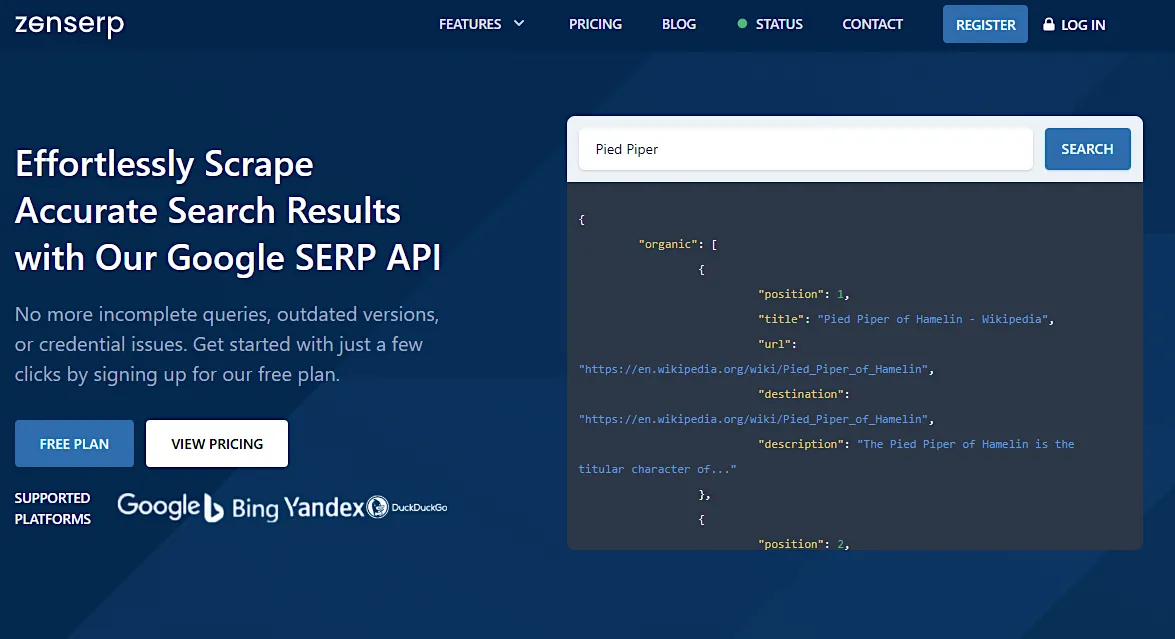
Key Features:
- Google-first SERP API with structured JSON output.
- Supports News, Images, Videos, Maps, and Shopping search data.
- Locale/device parameters for targeted results.
- Batch endpoint and keyword volume/CPC is available on Medium and higher pricing tiers.
Pricing: Free for 50 searches/month, with Small, Medium, Large, and Very Large tiers starting at $49.99/5,000 searches.
Review: “Zenserp (also) offers a free consulting service, in case you need any help to integrate the service.”
7. Apify – Best for Customer Google SERP Workflows
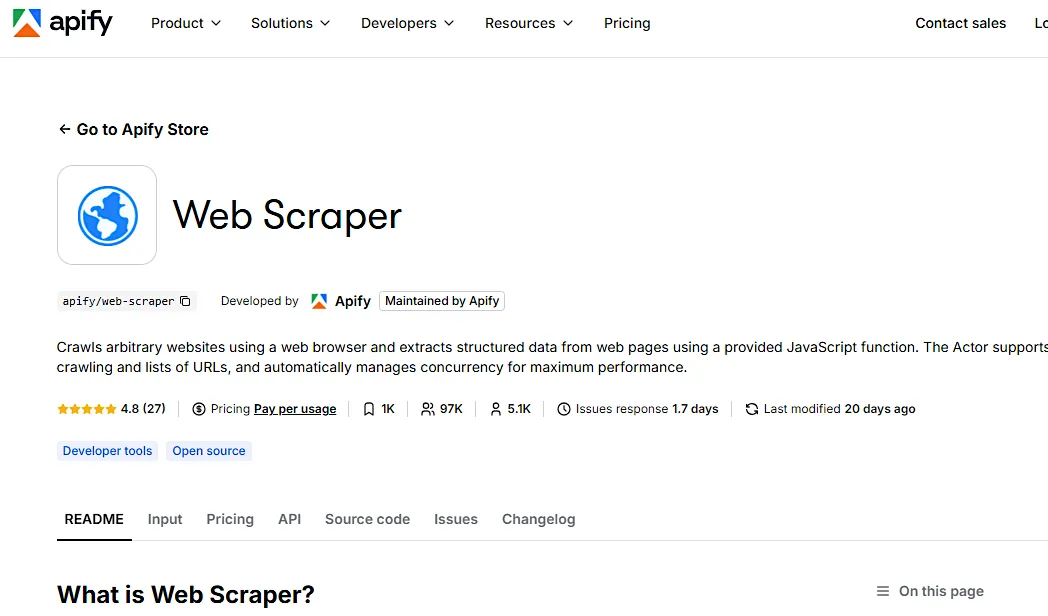
Key Features:
- Scrapes organic, ads, People Also Ask, and AI Mode / AI Overviews (with add-on).
- Can run commands via REST API, schedule jobs, and export to JSON/CSV/XLSX.
- Platform API for orchestrating runs, webhooks, datasets, and storage, which can be useful for end-to-end pipelines that mix SERP with other sources.
- Geo/device controls (country, language, UULE geolocation), concurrency settings, and proxy/anti-blocking are handled by the platform.
Pricing: Usage-based pricing starting at $4.50/1,000 searches. The AI Mode add-on is priced separately.
Review: “(The) Apify platform has everything you need for scraping the data from any website.”
8. Ahrefs API - Best for Backlink-centric SEO Datasets
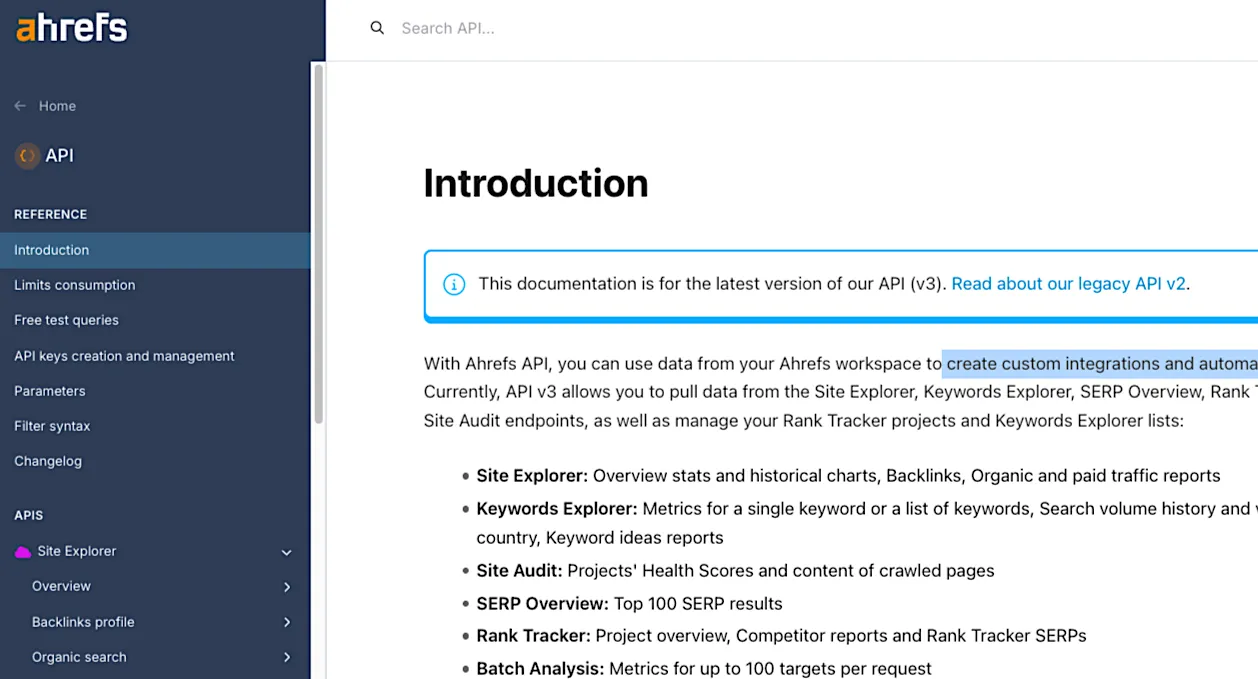
Key Features:
- Provides API access to Ahrefs’ core datasets, including backlinks, referring domains, organic keyword rankings, and keyword research metrics from Keywords Explorer.
- Useful for research and competitive modeling with a focus on link intelligence quality and historical breadth.
- Users can create custom integrations and automations.
Pricing: Consumption-based with subscription options starting at $500/month for 500,000 rows.
Review: “Sometimes the data feels a little behind, especially when tracking backlinks or keyword rankings. It doesn’t always update in real-time, which can make it harder to see quick changes.”
9. Bright Data SEO API - Best for Very High Volumes
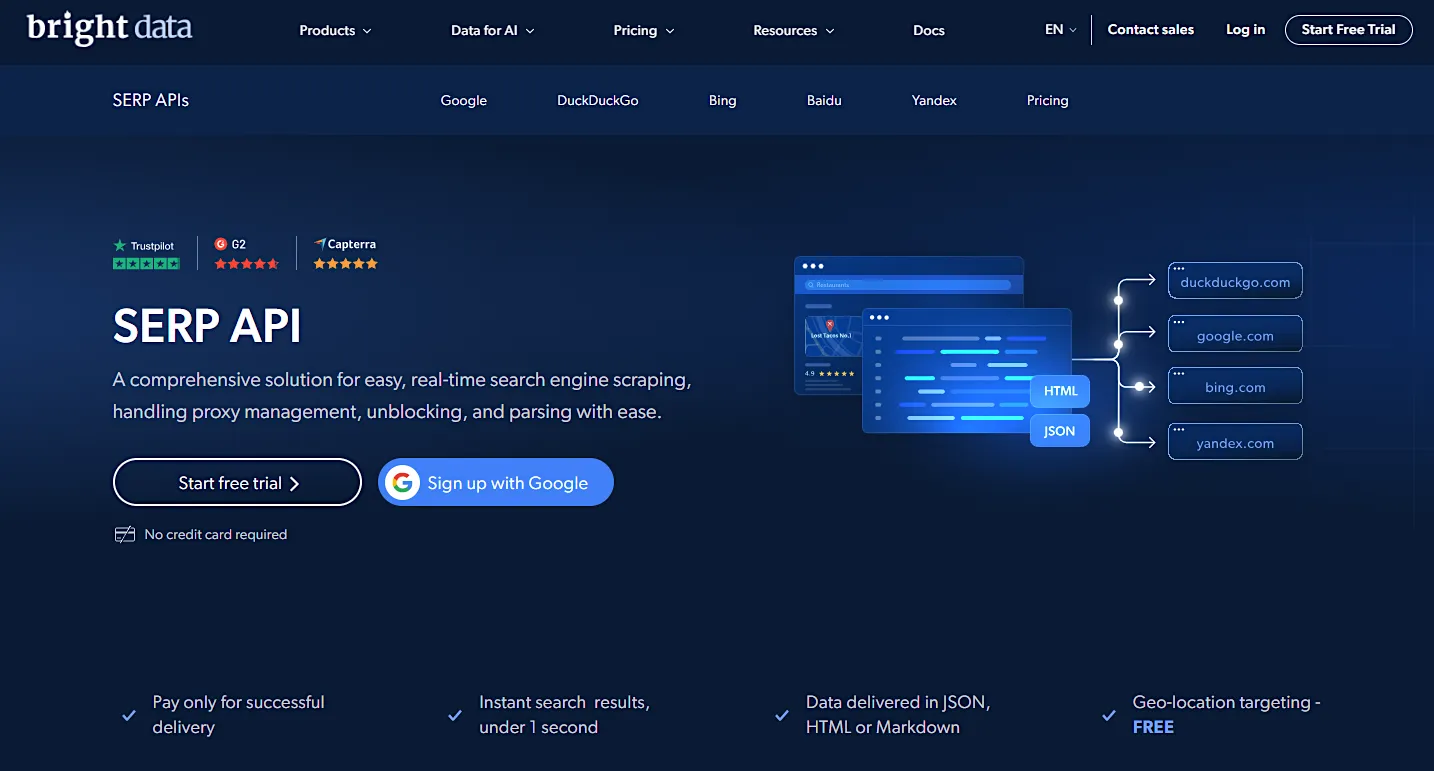
Key Features:
- SERP scraping with JSON/HTML output, automatic retries, CAPTCHA solving, IP rotation, browser fingerprinting, and unlimited concurrency.
- Multi-engine coverage (Google, Bing, DuckDuckGo, Yandex) with granular geotargeting and desktop/mobile user-agents.
- Asynchronous job mode (send now, fetch later).
Pricing: Pay-as-you-go from $0.75/1000 results with Growth, Business, and Premium tiers offering volume discounts.
Review: “The Web Scraper API and Scraping Browser provide programmatic and no-code access to structured web data, with built-in AI algorithms for data cleaning and structuring.”
10. Moz API - Best for Lightweight Authority & Link Signals
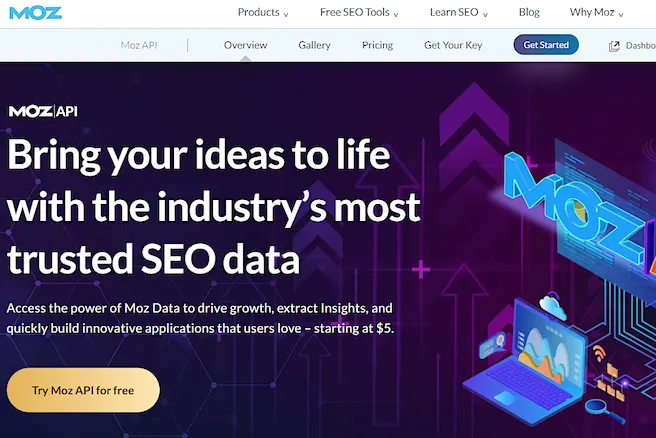
Key Features:
- Programmatic authority metrics and link audits (DA/PA/Spam Score + link diffs) for brand monitoring.
- Links API endpoints for URL Metrics, Links, Top Pages, Anchor Text, Link Intersect, with Domain Authority, Page Authority, Spam Score, and history options.
- Extensive link index (40T+ links) to support competitive link diffing and authority tracking.
Pricing: Ask for a custom quote.
Review: “We can connect to Moz API, make a single request, and get all the link data that our customers need.”
Go Beyond SEO Ranking Data with Nimble
AI-driven results are reshaping search and reducing the visibility of organic listings. Outdated ranking reports cannot keep up with these shifts, which is why SEO ranking APIs have become essential for teams that need accurate, current data across markets and devices. They give developers and data leaders structured feeds they can trust, while providing marketers with insights that reflect what users see in real-time.
Nimble takes this further with an API that captures full SERPs as structured outputs and can collect data in real-time or on a set schedule. The results flow directly into cloud storage and BI tools, so teams don’t have to build or maintain their own pipelines. Beyond rank tracking, Nimble also provides other ways to help businesses access real-time web data at scale, including:
- Web Search Agents that deliver real-time, fully structured data at scale.
- An AI/LLM training data solution with inference-ready pipelines and reliable data freshness.
- Direct integration into BI tools.
- Market intelligence with data that includes pricing, promotions, inventory, and reviews so you can connect shifts in SERPs to business outcomes.
Connect with Nimble today to see how we turn SEO ranking data into a competitive advantage.
FAQ
Answers to frequently asked questions

.avif)





.png)
